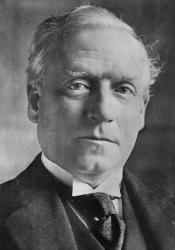H.H. Asquith as Prime Minister
H.H. Asquith was the Prime Minister of England from 1908 to 1916. Asquith was 1st earl of Oxford and Asquith. He was a member of the Liberal party and ran for Prime Minister under this party. While Asquith was Prime Minister, he faced many controversies. The Conciliation bill to give women the right to vote were brought up during his time as Prime Minister and while promising that there would be facilities for a bill such as this in Parliament, he instead favored a bill for universal manhood suffrage. These facilities that H.H. Asquith promised for a conciliation bill for women to gain the right to vote was mainly referring his support and a place politically in Parliament that would allow such a bill to be passed. There were many more controversies during Asquith’s political career such as his interactions with political extremists as well as anarchists. It is because of these many opponents of his time as Prime Minister that his political career is looked upon in a negative light. Such opponents included the suffragettes who placed a great amount of blame on Asquith for the Conciliation bills not being passed. The suffragettes had every right to place this blame on Asquith since he led them to believe that he would welcome such a bill and instead favor suffrage for all men. Asquith was also the acting Prime Minister for the beginning of World War I as well as passing the Parliament Act of 1911 which dealt with the House of Lords.
The accompanying articles show H.H. Asquith’s political stance as Prime Minister as well as a look into his time as Prime Minister. The Britannica article on Asquith offers a more general view of Asquith’s life and the dates which he served as Prime Minister as well as other events in his life. The article “The Women’s Suffrage Movement in England” shows on pages 604-605 how Asquith claimed he welcomed a women’s suffrage bill but did not favor it when it was brought up. The article entitled “H. H. Asquith and Britain's Manpower Problem, 1914–1915” by John Gordon Little shows Asquith’s time as Prime Minister and particularly how he handled his involvement in World War I. Little’s article brings up a key point about Asquith’s political career which is how over time his actions have been portrayed in a negative light. The article shows a deeper view of Asquith’s liberal views and his stance on issues such as compulsory military service. The newspaper article entitled “Mr. Asquith and the Anarchists” shows the political unrest during his time as Prime Minister. This article shows how Asquith dealt with Anarchists at this time and how Anarchists were defined at this time. The article shows that other political unrest at this time apart from the suffragette movement. However, this article is about H.H. Asquith before he was Prime Minister when he was Home Secretary. The article allows a view of another controversial event that Asquith handled during his political career.
H.H. Asquith
https://www.britannica.com/biography/H-H-Asquith-1st-earl-of-Oxford-and-Asquith
Robert Norman William Blake, Baron Blake. “H.H. Asquith, 1st Earl of Oxford and Asquith.” Encyclopædia Britannica, Encyclopædia Britannica, Inc., 8 Sept. 2018, www.britannica.com/biography/H-H-Asquith-1st-earl-of-Oxford-and-Asquith.
Women's Suffrage Movement in England
https://www.jstor.org/stable/pdf/1944309.pdf
Turner, Edward Raymond. “The Women's Suffrage Movement in England.” The American Political Science Review, vol. 7, no. 4, 1913, pp. 588–609. JSTOR, JSTOR, www.jstor.org/stable/1944309.
H. H. Asquith and Britain's Manpower Problem, 1914–1915
LITTLE, JOHN GORDON. “H. H. Asquith and Britain's Manpower Problem, 1914–1915.” History, vol. 82, no. 267, 1997, pp. 397–409. JSTOR, JSTOR, www.jstor.org/stable/24423466.
Mr. Asquith and the Anarchists
https://hdl.handle.net/2027/coo.31924057525291?urlappend=%3Bseq=730
“Mr. Asquith and the Anarchists .” The Spectator , 18 Nov. 1893.

